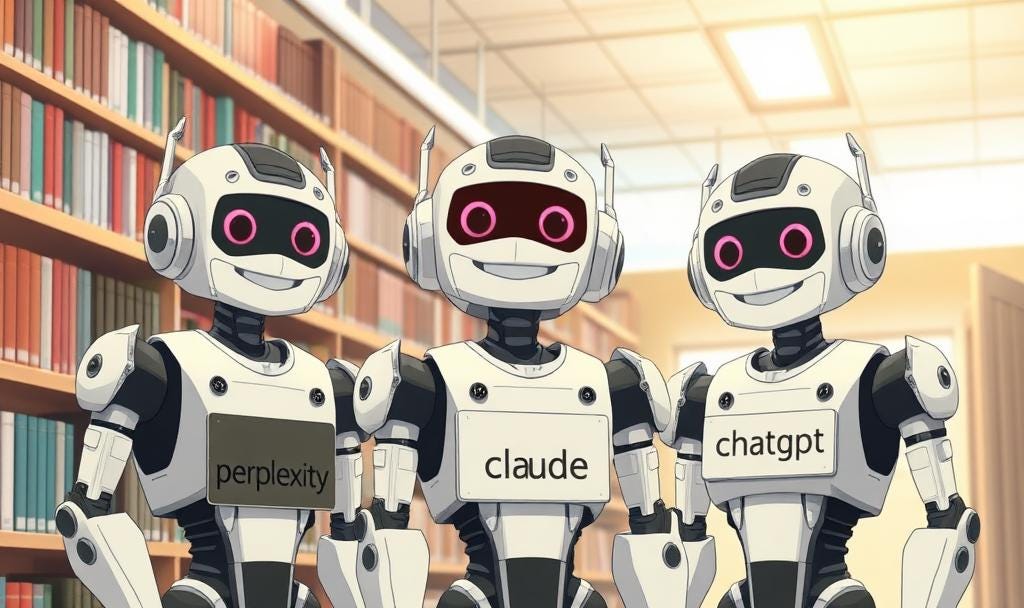I Tested ChatGPT, Claude, and Perplexity as Search Engines. Here's the Winner!
7 months of real-world testing reveals which AI actually saves writer's time
Nowadays, I don't start any search with Google—I turn first to my favorite AIs, Claude and Perplexity. Though I still use ChatGPT from time to time.
After seven months of working closely with various AIs, I've come to understand their strengths and weaknesses. If you're new to this and unsure which AI to choose, this quick guide will help you pick the one that fits your needs.
Who This Is For
If you're a newsletter writer, content creator, genre writer, or non-fiction author who spends hours hunting down information, this breakdown will save you countless research hours.
As a writer and a researcher, I’ve tested these tools on everything from obscure historical facts to finding specific book quotes to tracking the latest AI developments.
Your choice of AI assistant can be the difference between efficient, accurate research and frustrating, time-wasting searches.
Beyond Simple Questions: Advanced Research Needs
Sure, any AI can tell you fun facts or give parenting advice.
But writers need something different—we need specialized, accurate, citable information.
Historical facts that pass fact-checking. Specific book references. The right quotes. Relevant social research. Breaking news in our field.
ChatGPT, Perplexity, and Claude approach these needs differently. Here's the review based on my experience, how each AI performs in deeper, more focused research:
ChatGPT: The Table-Loving Generalist
Strengths:
Delivers accurate, fact-checked information
Likes to organize info in tables (great for structured summaries)
Good for quick overviews
Weaknesses:
Often includes extra material only loosely related to your query, which can broaden perspectives but slows down the process as you sift through what's relevant
Sometimes lists authors without naming their works, requiring follow-up questions
Doesn't provide source links by default—and when you ask for links, some turn out to be nonexistent
Tends to give brief, straightforward answers without much context
Best for: Quick familiarization and structured data presentation
Pro tip: Always specify in your prompt that you want sources linked for every fact—essential for accuracy, especially with citations or historical data.
Claude: The Eager Scholar
Strengths:
Fact-checks and provides accurate information
More focused than ChatGPT
Shines in explaining things clearly with examples
Uses scholarly language and considers different viewpoints
More detailed responses
Remembers to include source links in future answers once you ask
Weaknesses:
Gives you core information plus additional related names or ideas (even when not requested), enriching understanding but adding to your filtering workload
Sometimes provides incomplete info—author names without work titles
Sources aren't cited unless specifically requested
Best for: Deep dives into topics from multiple angles when you have time to sort through comprehensive information
Pro tip: Be explicit upfront about wanting source links.
Perplexity: The Precision Master
Strengths:
Nails accuracy, giving exactly what you ask for—nothing more, nothing less
Immediately provides author names, work titles, and links to online texts
Ends answers with related questions (fantastic for exploring new angles)
Supplements answers with images and videos, including relevant YouTube clips
Most thorough yet accessible responses
Best for: Precise research when you want exactly what you need without fluff, plus guided exploration of related topics
The Verdict: Which AI Should You Choose?
Perplexity is the most precise for finding information and reliable sources. It delivers just what you need without fluff, saving you time. Plus, it helps guide your research by suggesting additional questions to explore if you want to dive deeper. Perfect if you want to get quickly up to speed on a topic without getting sidetracked.
Claude is great if you enjoy studying a topic from a wide variety of angles and don't mind spending extra time sorting through a broader set of information.
ChatGPT is similar to Claude but less precise and not as good with accurate links. It's ideal if you like your information organized in neat tables, a unique feature of ChatGPT.
Real-World Test: Book Summaries and Error Handling
Summarizing Philosophical Works
All three AIs produced similar summaries in terms of meaning, though ChatGPT and Perplexity explained ideas more simply and clearly, closer to the essence of the essays than Claude. The summaries, however, were brief and general—each limited itself to one main thesis despite my requests for more.
The Truth Test: What Happens When Your Question Is Wrong?
Here's where things got interesting. I intentionally asked: "Provide specific examples for every historical period of authorship evolution that Foucault defines in 'What is an Author?'"
The problem: Foucault's essay doesn't actually provide chronological periods—it's a theoretical framework, not a historical timeline.
Perplexity: Acted like a yes-man, providing a periodization that wasn't explicitly in the text.
Claude: Straightforward but vague, saying Foucault doesn't offer periodization but proposing a general one without specifying sources.
ChatGPT: Winner! Gave the most elegant response: "Michel Foucault's analysis does not provide a strict chronological history of authorship. However, his framework allows us to identify illustrative examples from different periods that embody changes in the notion of authorship."
It then explained how different authors relate to transformative periods, turning my flawed question into a learning opportunity.
The Three Types of AI Personalities
After months of daily use, each AI reminds me of different types of students:
Claude = The overachiever trying to impress everyone. Gives you what you need plus everything that might be useful. Smart but requires filtering.
ChatGPT = The generally knowledgeable student who needs prodding. Familiar with material but requires multiple follow-up questions for complete answers.
Perplexity = The efficient straight-A student. Provides exactly what's needed with perfect citations and shows you what questions the experts are asking.
The Verdict: Which AI Should You Choose?
After 7 months of intensive testing, here's my honest assessment:
Choose Perplexity if you want:
Maximum research efficiency
Accurate, focused information without fluff
Guided exploration through suggested questions
Time-saving precision over comprehensive coverage
Choose Claude if you want:
Deep, comprehensive topic exploration
Excellent explanations with examples
Broader perspective (and don't mind filtering)
Academic-level depth and nuance
Choose ChatGPT if you want:
Organized, table-format information
General familiarity with topics
Don't mind asking follow-up questions
Casual research approach
Dear Substackers, what has your experience with these AIs been? Which one do you prefer? Share your thoughts in the comments, I’d love to hear about your experiments and insights.
If my article has been helpful to you, you can buy me a coffee. I would deeply appreciate your encouragement and support as I continue to share meaningful content. Thank you for inspiring me to keep writing!




Thankyou for the article but I'm always confused after generating stories from the prompt do they really belong to me? A kind of ethical dilemma
This is really helpful. Thank you for the easy to follow break-down.
I hadn’t used perplexity, but I just started thanks to you.
BTW, in your analyses, did you use the free version of each, or a paid version?